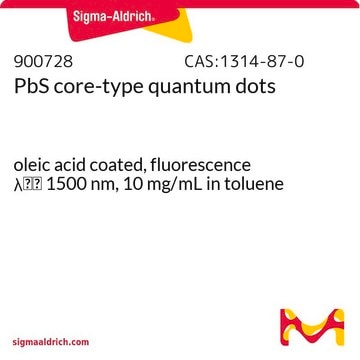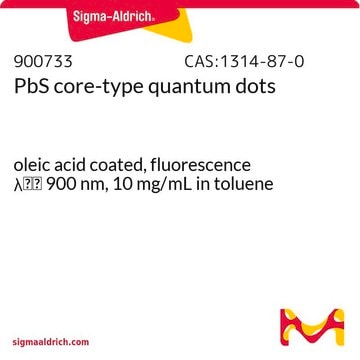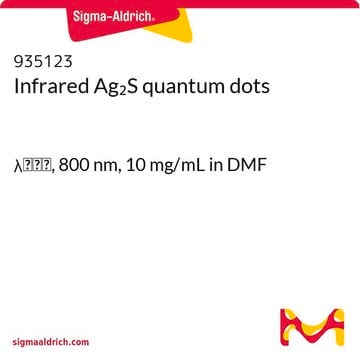935085
Infrared PbS quantum dots
λmax, 1650 nm, 100 mg/mL in toluene
Synonyme(s) :
Fluorescent nanocrystals, INFIQ® quantum dots, Lead based core type QDs
About This Item
Produits recommandés
Description
>6 peak/valley ratio
Niveau de qualité
Forme
liquid
Concentration
100 mg/mL in toluene
100 mg/mL
Taille des particules
<15 nm (Nanoparticle)
λmax
<100 nm (FWHM)
1650 nm
Température de stockage
2-8°C
InChI
1S/Pb.S
Clé InChI
XCAUINMIESBTBL-UHFFFAOYSA-N
Vous recherchez des produits similaires ? Visite Guide de comparaison des produits
Catégories apparentées
Description générale
Application
Informations légales
Produit(s) apparenté(s)
Mention d'avertissement
Danger
Mentions de danger
Conseils de prudence
Classification des risques
Aquatic Chronic 2 - Asp. Tox. 1 - Flam. Liq. 2 - Repr. 1A - Skin Irrit. 2 - STOT RE 2 - STOT RE 2 Inhalation - STOT SE 3
Organes cibles
Central nervous system
Code de la classe de stockage
3 - Flammable liquids
Classe de danger pour l'eau (WGK)
WGK 3
Point d'éclair (°F)
39.2 °F
Point d'éclair (°C)
4 °C
Certificats d'analyse (COA)
Recherchez un Certificats d'analyse (COA) en saisissant le numéro de lot du produit. Les numéros de lot figurent sur l'étiquette du produit après les mots "Lot" ou "Batch".
Déjà en possession de ce produit ?
Retrouvez la documentation relative aux produits que vous avez récemment achetés dans la Bibliothèque de documents.
Notre équipe de scientifiques dispose d'une expérience dans tous les secteurs de la recherche, notamment en sciences de la vie, science des matériaux, synthèse chimique, chromatographie, analyse et dans de nombreux autres domaines..
Contacter notre Service technique









